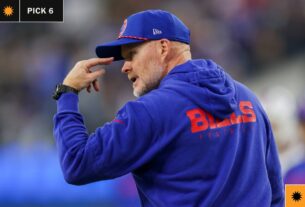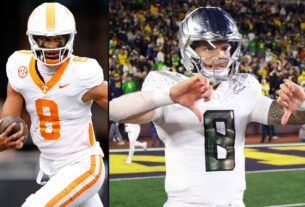There it is, plainly stated in the Baseball Writers Association of America’s instructions to voters, for all those who wish to play “gotcha” with Shohei Ohtani’s quest to win his third MVP award in four years.
In listing the five criteria, which remain the same as they were written on the first ballot in 1931, the BBWAA starts with, “Actual value of a player to his team, that is, strength of offense and defense.”
Ohtani, recovering from major elbow surgery, isn’t playing his version of defense this season, performing as an elite starting pitcher. But he is still the front-runner for National League MVP because his offense is that much better than everyone else’s.
No primary DH has ever won an MVP award. The BBWAA’s instructions, however, make clear that pitchers and designated hitters are eligible. They also state, “There is no clear-cut definition of what Most Valuable means.”
In other words, voters can pick whoever they want, using any rationale they want. The process, though, is fully transparent. For every award, the BBWAA reveals the ballots of all 30 voters, two from each city in each respective league. So, voters must be prepared to defend their selections, and most are keenly aware of the blowback questionable choices can produce on social media.
Ohtani, once again, is a unique case. He entered Tuesday’s play with 41 home runs and 40 stolen bases in 44 attempts, making him the sixth 40-40 player in AL/NL history. His latest milestone is partly the product of him running more after moving to the leadoff spot in place of Los Angeles Dodgers teammate Mookie Betts, who suffered a fractured left hand on June 16 and missed nearly two months.
Major League Baseball implemented rules last season to enhance base stealing, but no player has gone 45-45, much less 50-50. In the likely event Ohtani makes history, he is going to be awfully difficult to deny – just as Aaron Judge was difficult to deny in the AL after his record 62-homer campaign in 2022, even though Ohtani had 34 homers and an .875 OPS as a hitter and a 2.33 ERA in 166 innings as a pitcher.
In MVP races, the terms of engagement often change. Voters generally base their decisions on a variety of statistics, including wins above replacement, an estimate of a player’s combined offensive, defensive and base running value — and one that different websites calculate in different ways.
Many voters, though, also are influenced by narratives. Ohtani has one narrative working for him: the unicorn narrative. He’s amazing, no one does what he can. He also might have two narratives working against him. The anti-DH narrative. No way I’m voting for half a player! And the Ohtani fatigue narrative. Let’s find someone else.
The anti-DH narrative did not stop David Ortiz from attaining five straight top-five finishes between 2003 and ‘07, two in the top three. Frank Thomas (1991, 2000), Paul Molitor (1993), Edgar Martinez (1995), Victor Martinez (2014) and Yordan Alvarez were the other DHs to achieve top-three results.
At the moment, Ohtani is not even the only strong DH candidate in the NL. The Atlanta Braves’ Marcell Ozuna leads the NL in batting average and RBIs and is a reasonably close second to Ohtani in slugging, OPS and adjusted OPS+, which accounts for ballpark factors. Still, primary DHs face an undeniable handicap in the voting. Otherwise, one would have won the award already.
But who are realistic alternatives to Ohtani?
The first challenger was Betts, whose move to shortstop and stellar hitting made him an early MVP favorite. All that changed when the Kansas City Royals’ Dan Altavilla broke Betts’ hand with a 97.9 mph fastball on June 16, sidelining him for 45 games. Upon returning on Aug. 12, Betts moved back to right field.
Arizona Diamondbacks second baseman Ketel Marte then mounted a strong case, only to be derailed by a sprained left ankle that has limited him to six at-bats since Aug. 8 and kept him on the injured list since Aug. 19.
The latest threat to Ohtani is New York Mets shortstop Francisco Lindor, who is approaching 30-30 while rating as an elite defensive shortstop according to outs above average, though only a slightly above average one in defensive runs saved.
Lindor, through Monday, led Ohtani in FanGraphs’ version of WAR (6.6-6.2) but trailed both him and Marte in Baseball Reference’s version (6.6-6.0-5.8). MLB.com’s Mike Petriello, a leading statistical analyst, warns not to place too much emphasis on tiny decimals of WAR, arguing the differences are small enough for the values of the players to be virtually identical. The discrepancies in the two websites’ calculations stem from FanGraphs basing its defensive component on outs above average and Baseball Reference basing it on defensive runs saved.
The difficulty in measuring defense increases the difficulty of valuing a player’s defensive proficiency in MVP voting. Obviously, Lindor and Marte are contributing more than Ohtani defensively. Lindor is a candidate to win his first NL Gold Glove. He has not missed a game, while Ohtani has missed three. But is that enough to compensate for Ohtani’s 168-point advantage in OPS entering Tuesday’s play?
Ohtani also held a significant edge over Lindor in win probability added, a category led by San Diego Padres left fielder Jurickson Profar, another potential top-10 MVP finisher. Win probability added measures the importance of a specific plate appearance, stolen base or caught stealing, quantifying the percent change in a team’s chances of winning from one event to the next.
While Ohtani’s stolen-base attempts have increased significantly over the course of the season — he had 18 combined in the first three months, then followed that with 14 in July and 12 so far in August — his motivation appears to stem more from a desire to help his team than pad his numbers. All of his stolen-base attempts in August have made sense within the context of the game.
One month remains in the season. The NL MVP race still might change. Perhaps Marte will return to lead the Diamondbacks past the Dodgers for the NL West title. Perhaps Lindor will continue his wondrous play since mid-May and lift the Mets past the Braves for the third NL wild card.
A primary DH winning MVP would be difficult for some to accept, even if the instructions to voters specifically allow for the possibility. The only way a DH should win, however, is if he separates himself enough from the field offensively to overcome his lack of defensive contribution.
At 40-40, Ohtani is darned close. At 45-45 or 50-50, he would pretty much end the conversation.
(Top photo of Shohei Ohtani: Skalij / Los Angeles Times via Getty Images)




